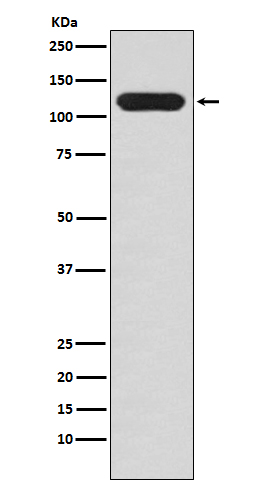MUC4 Rabbit mAb [3r3G]Cat NO.: A35965
Western blot(SDS PAGE) analysis of extracts from MCF7 cell lysate.Using MUC4 Rabbit mAb [3r3G]at dilution of 1:1000 incubated at 4℃ over night.
Product information
Protein names :Ascites sialoglycoprotein 1; Ascites sialoglycoprotein 2; Ascites sialoglycoprotein; ASGP; ASGP-1; ASGP-2; Muc4; Mucin 4 cell surface associated; Mucin 4 tracheobronchial; Mucin-4 beta chain; Testis mucin;
UniProtID :Q99102
MASS(da) :542,307
MW(kDa) :120kDa
Form :Liquid
Purification :Affinity-chromatography
Host :Rabbit
Isotype : IgG
sensitivity :Endogenous
Reactivity :Human
- ApplicationDilution
- 免疫印迹(WB)1:1000-2000
- The optimal dilutions should be determined by the end user
Specificity :Antibody is produced by immunizing animals with A synthesized peptide derived from human MUC4
Storage :Antibody store in 10 mM PBS, 0.5mg/ml BSA, 50% glycerol. Shipped at 4°C. Store at-20°C or -80°C. Products are valid for one natural year of receipt.Avoid repeated freeze / thaw cycles.
WB Positive detected :MCF7 cell lysate.
Function : Membrane-bound mucin, a family of highly glycosylated proteins that constitute the major component of the mucus, the slimy and viscous secretion covering epithelial surfaces (PubMed:10880978). These glycoproteins play important roles in the protection of the epithelium and are implicated in epithelial renewal and differentiation (PubMed:10880978). Regulates cellular behavior through both anti-adhesive effects on cell-cell and cell-extracellular matrix interactions and its ability to act as an intramembrane ligand for ERBB2. Plays an important role in proliferation and differentiation of epithelial cells by inducing specific phosphorylation of ERBB2. In polarized epithelial cells, segregates ERBB2 and other ERBB receptors and prevents ERBB2 from acting as a coreceptor. The interaction with ERBB2 leads to enhanced expression of CDKN1B. The formation of a MUC4-ERBB2-ERBB3-NRG1 complex leads to down-regulation of CDKN1B, resulting in repression of apoptosis and stimulation of proliferation. Its ability to promote tumor growth may be mainly due to repression of apoptosis as opposed to proliferation..
Tissue specificity :Expressed in the thymus, thyroid, lung, trachea, esophagus, stomach, small intestine, colon, testis, prostate, ovary, uterus, placenta, and mammary and salivary glands. Expressed in carcinomas arising from some of these epithelia, such as lung cancers, squamous cell carcinomas of the upper aerodigestive tract, mammary carcinomas, biliary tract, colon, and cervix cancers. Minimally or not expressed in the normal pancreas or chronic pancreatitis, but is highly expressed in pancreatic tumors and pancreatic tumor cell lines..
Subcellular locationi :[Mucin-4 beta chain]: Cell membrane,Single-pass membrane protein.
IMPORTANT: For western blots, incubate membrane with diluted primary antibody in 1% w/v BSA, 1X TBST at 4°C overnight.


